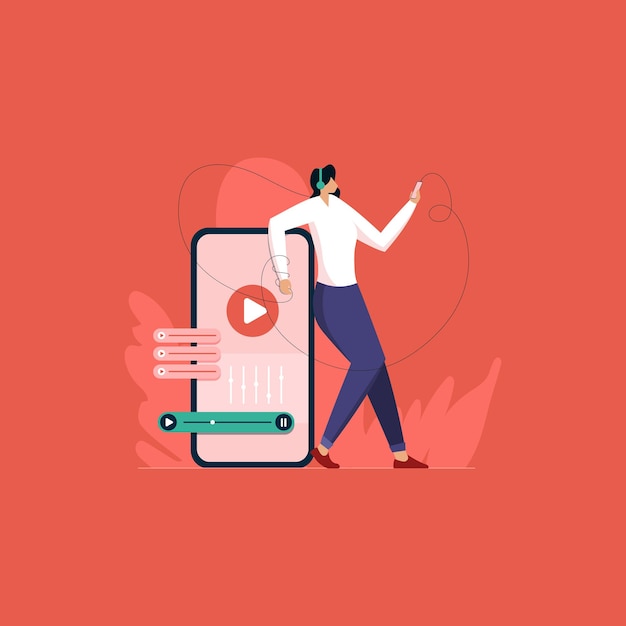In today’s digital-first world, music consumption has evolved from traditional methods to dynamic streaming experiences. Platforms like Spotify, Apple Music, and SoundCloud have set high expectations for seamless user interfaces, real-time streaming, personalized playlists, and social sharing features. If you're an entrepreneur, startup, or media brand planning to launch your own music app, one of the most crucial steps is selecting the right music streaming app developer.
With the right team behind you, you can build a scalable, secure, and user-friendly product that stands out in the competitive landscape. This guide breaks down how to choose the right developer for your music streaming app, the skills to look for, and the mistakes to avoid.
1. Define Your App Requirements Clearly
Before beginning your search for a developer or development agency, you need to clearly define your project goals and scope. Start by asking yourself:
- Will your app offer on-demand streaming, live radio, or live concerts?
- Do you plan to monetize through ads, subscriptions, or in-app purchases?
- Should your app support offline listening, real-time lyrics, or social sharing?
The more precise you are about your vision, the easier it will be to evaluate a developer’s experience and capabilities.
2. Evaluate Technical Skills and Experience
A capable developer for a music streaming app should have expertise in the following:
- Front-end and back-end development using tools like React Native, Swift, Kotlin, Node.js, and Firebase
- Real-time streaming protocols such as HLS and DASH
- Cloud integration (AWS, Google Cloud) for scalable music storage
- Database optimization for storing large volumes of user and track data
- Audio APIs like Spotify SDK, Apple MusicKit, or custom server integrations
- Third-party tools for analytics, crash reporting, and notifications
If your app involves broadcasting or virtual events, the developer should also understand Live Music Streaming App Development, which includes handling large volumes of concurrent users without audio lag or downtime.
3. Review Their Portfolio and Case Studies
A developer’s portfolio reveals their real-world experience and problem-solving ability. Look for:
- Prior projects in the music, media, or entertainment domain
- Case studies with metrics on user engagement, load time, or retention
- Screenshots or live app links showcasing UI/UX quality
- Reviews or testimonials from clients
If they’ve built a music app before, ask how they approached issues like licensing, compression, DRM (Digital Rights Management), or offline playback.
Even if the portfolio doesn’t show a direct music app, developers with experience in Live Streaming App Development Company environments may still be a great fit, given their knowledge of real-time data handling, content delivery networks (CDNs), and performance tuning.
4. Assess Their Understanding of Legal and Licensing Needs
Unlike typical mobile apps, music streaming involves complex licensing. Depending on your region and the content you offer, you may need:
- Public performance licenses
- Mechanical licenses
- Distribution agreements with labels and publishers
An experienced developer or development agency should have a basic understanding of these legal frameworks. They don’t need to be legal experts, but they should be familiar enough to avoid building features that could expose you to risks.
5. Communication and Collaboration Style
You’ll be working closely with the developers, so it’s important that they have:
- Strong communication skills (responds clearly and promptly)
- Project management tools (Jira, Trello, or Notion)
- Clear development timelines
- Weekly or bi-weekly progress updates
Transparency and responsiveness are essential for hitting milestones and ensuring the final product aligns with your expectations.
6. Prioritize Security and Data Privacy
Music apps often require access to personal information, payment credentials, and listening preferences. Your developer must implement:
- End-to-end encryption
- OAuth2 or social logins
- Secure cloud storage protocols
- Compliance with GDPR, CCPA, or other local data laws
Additionally, ensure they are familiar with DRM systems to prevent unauthorized distribution or piracy of content.
7. Post-Launch Support and Maintenance
The job isn’t done once your app goes live. Bugs may appear, user feedback might suggest new features, and regular OS updates require app adjustments. A reliable developer will offer:
- Ongoing support plans
- Bug fixes
- Feature updates
- Monitoring tools for crash reports and analytics
When you're ready to Hire Music Streaming App Developers, ensure you choose professionals who offer long-term commitment—not just a one-time delivery.
8. Budget and Timeline Transparency
Finally, make sure your developer provides a detailed project estimate that includes:
- Feature-by-feature cost breakdown
- Timeline for each phase (design, development, testing, deployment)
- Clear payment milestones
- Flexibility for feature additions or scope changes
While cost is a major factor, don’t just go with the cheapest option. Consider the long-term value a skilled developer brings in terms of quality, performance, and scalability.
Conclusion
Choosing the right developer is one of the most important decisions in your music app journey. A successful partnership depends on clarity, technical skill, industry experience, and a shared vision for the app’s future. Whether you're building a niche music app or aiming to rival industry giants, a well-chosen team will make all the difference.
With increasing demand for both on-demand and live content, Live Music Streaming App Development is expected to dominate the future of digital entertainment. By collaborating with a reputable Live Streaming App Development Company, you’ll be able to launch a secure, scalable, and feature-rich app that resonates with your audience.




.png)

Comments